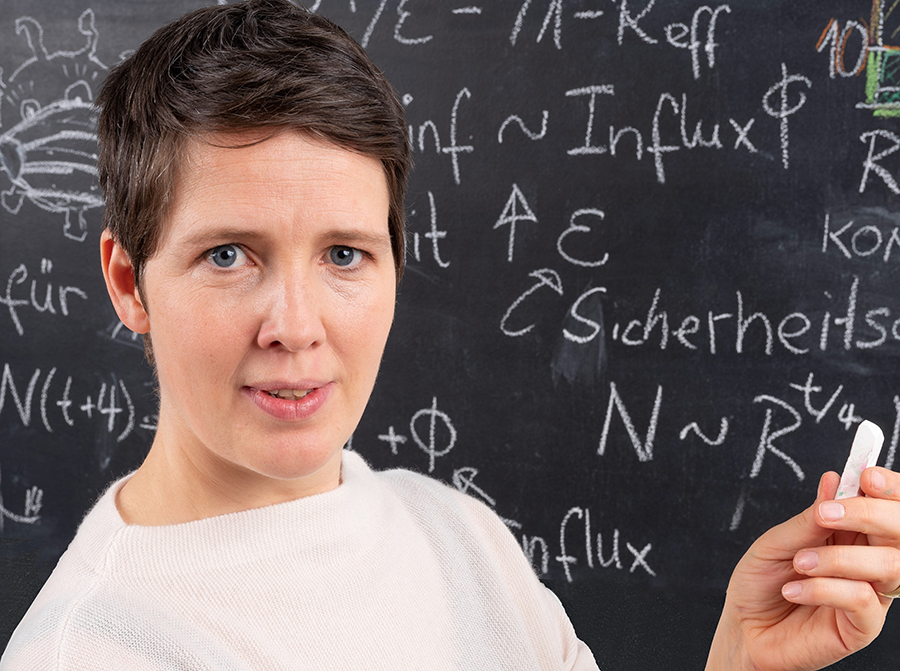Viola Priesemann receives communication award of the German Physical Society
With this award, the German Physical Society recognizes the scientist for her outstanding commitment to communicating scientific findings on the corona pandemic.

V. Priesemann, photo: H. Ziegenfusz
/DPG/BN, Duppé/ In recognition of her dedicated and fearless public advocacy of fact-based discourse on the Covid 19 pandemic, the German Physical Society (DPG) honors physicist Viola Priesemann of the Max Planck Institute for Dynamics and Self-Organization in Göttingen with this year’s Medal for Scientific Communication.
“Ms Priesemann immediately recognized that her research on neural networks and the role of phase transitions in information processing was and is of great importance for understanding the dynamics of Covid-19 propagation,” says DPG President Lutz Schröter.
Viola Priesemann quickly advanced to become a competent and serious interlocutor for politicians and the media on forecasts of the development of the pandemic and possible measures to contain it. Priesemann is a sought-after discussion and interview partner and a valued panelist in countless media and talk shows in which she demonstrates her outstanding ability to convey the complex interrelationships in an extremely comprehensible and clear manner.
The German weekly Die Zeit repeatedly published her assessments and positions on the pandemic situation and possible countermeasures along with a multi-page dossier on her work. Her lecture on the physics of Covid 19 containment, which she gave together with her colleague Eberhard Bodenschatz, was accessed almost 10,000 times. She also provided scientific support for the DPG fact sheet “The Physics of the Corona Pandemic,” which informs decision-makers in politics and industry, as well as schools, about how physics can help control the pandemic.
She is also the initiator of a pan-European position statement and one of the authors of the position statements of non-university research institutions and the John Snow Memorandum, all of which emphasize the need for a common European approach to contain Covid-19 and put forward an action plan. Tirelessly, Viola Priesemann confronts counterarguments and explains her analyses and scientific facts. In February 2021, she received the Communitas Award of the Max Planck Society for her science communication during the Corona pandemic.
About Viola Priesemann
Viola Priesemann (born 1982 in Bobingen, Germany) conducted research on neuronal information processing at the École normale supérieure in Paris, Caltech in California, and the Max Planck Institute for Brain Research in Frankfurt, Germany, following her studies at the Technical University of Darmstadt. In 2013, she received her PhD in physics from the University of Frankfurt. Priesemann’s doctoral thesis focused on propagation dynamics in neural networks and the role of phase transitions in information processing.
After working as a postdoc with Theo Geisel at the Max Planck Institute for Dynamics and Self-Organization in Göttingen, she became a fellow at the Bernstein Center for Computational Neuroscience Göttingen in 2014 and successfully applied for an independent Max Planck Research Group in 2015, which she has since led at the Max Planck Institute for Dynamics and Self-Organization in Göttingen.
Priesemann was a Fellow of the Elisabeth Schiemann Kolleg, is a member of the Junge Akademie and the Cluster of Excellence Multiscale Bioimaging, and she is a board member of the Campus Institute Data Science (CIDAS) at Göttingen University.
Award ceremony on November 12, 2021.
The awarding of the Medal for Scientific Communication of the German Physical Society is expected to take place at the ceremony on November 12, 2021, during the 42nd Day of the DPG at the Physikzentrum Bad Honnef. The award consists of an individually designed silver medal and a certificate. Previous award winners include TV presenter Ranga Yogeshwar, ESA astronaut Alexander Gerst, science journalists Norbert Lossau (WELT) and Manfred Lindinger (FAZ), and a by now 50-year-old program of the well-known German children’s program “Die Maus”.
This is a translation of the original press release.
About the Germany Physical Society
The German Physical Society (Deutsche Physikalische Gesellschaft e. V.; DPG), which was founded way back in 1845, is the oldest national and, with more than 60,000 members, also the largest physical society in the world. As a non-profit-making organisation it pursues no economic interests. The DPG promotes the transfer of knowledge within the scientific community through conferences, events and publications, and aims to open a window to physics for the curious. Its special focuses are on encouraging junior scientists and promoting equal opportunities. The DPG’s head office is at Bad Honnef am Rhein. Its representative office in the capital is the Magnus-Haus Berlin. Website: www.dpg-physik.de




